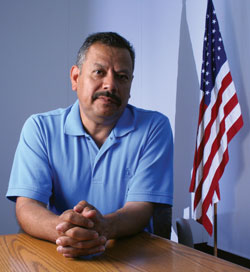SERGIO SALINAS loved Seattle from the moment he arrived in 1985. “After living in L.A., Seattle was paradise,” says Salinas, 48, now president of Service Employees International Union (SEIU) Local 6. Salinas is a political refugee from El Salvador. He was imprisoned in his country of birth for union activity and political organizing against the U.S.–backed military dictatorship that ruled the country for decades. He came to Seattle because he had friends here who were involved with the “sanctuary” movement—political, and often religious, activists who were helping Central American refugees. “They offered us options so we wouldn’t be homeless,” recalls Salinas who moved here with his wife and 2-year-old daughter.
Salinas had arrived in the U.S. two years before and struggled to survive in Los Angeles. “I loved this place. There were more opportunities. People were friendlier. The city was less segregated than L.A. It’s not as rough and crude. Seattle was more open-minded.” Salinas also loves the physical environment. “I even like the weather. Look at summer, how beautiful it is. The rivers, the lakes, the green—it’s worth six months of rain.”
Right after his arrival, Salinas took English classes at a community college and started working for the Washington Association of Churches on refugee issues. His next job was with the Washington Alliance for Immigration and Refugee Justice. Through that job, he met an executive board member with SEIU, a fast-growing, militant union that organizes among new immigrant populations and is very politically active. He became a union organizer at SEIU Local 6, a 3,400-member group of janitors and security guards. “It’s like the life of a salmon,” he says of his return to union work. He worked his way up through the ranks of the union and was elected president of his local in 2003.
Salinas has lived all over Seattle. He and his family moved from rental to rental— Ballard, University District, Green Lake. They bought their first home in West Seattle and now live in suburban SeaTac.
The biggest change Salinas has noticed in Seattle during his two decades here has been the increasing expense of living in the city. “Seattle has grown so much. It’s vibrant, but there isn’t enough space for people of all sorts of income levels. It’s heaven for developers. In our union, most of the members used to live in the city—now they live in White Center, Kent, Tukwila, Federal Way.”
Another, more welcome, change has been the influx of Latinos to the Seattle area. “We used to have to drive a long way to find a good Mexican restaurant. There weren’t any Salvadoran ones. Now there are a bunch of them.” He was uplifted by the immigrant marches of last spring. “Huge marches of, like, 60,000 people,” he says enthusiastically.
He now thinks of the Seattle area as home, but it took some 10 years. At first, he, like many refugees, planned to return to his country of birth. Then he bought a house, and his second daughter was born in Seattle. “The kids are growing. They are getting acculturated. They speak English.” Having been away from El Salvador for so long makes a difference, as well. “I miss my country, up to a point. When I go to visit El Salvador for two weeks, after a week I feel I want to return to Seattle. My friends are here. My family is here. My job is here. Seattle is my home.”—George Howland Jr.
Sergio Salinas’ Picks
Best Salvadoran Restaurant: “El Trapiche in Burien, with the best pupusas in Seattle.”
Best Salvadoran Bodega: “We don’t have one per se, but there is one store, Salva Mex, in Burien with Salvadoran products.”
Best Local Politician: “Definitely Ron Sims. Straight shooter, extremely good in workers and immigration issues.”
Best Local 2006 Political Race: “The 43rd District—going for Lynne Dodson. We need a teacher in Olympia!”
Best Union Organizing Tool: “Workers mobilizing for their rights and issues, along with community and political support.”
Best Local Spanish Media:Sea Latino.
Best Neighborhood: West Seattle.








